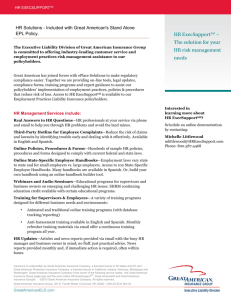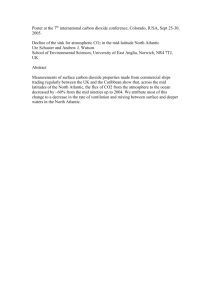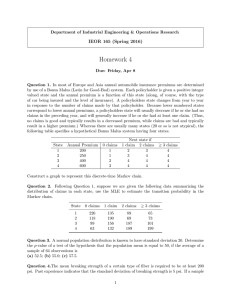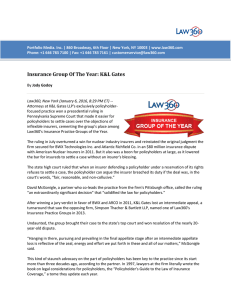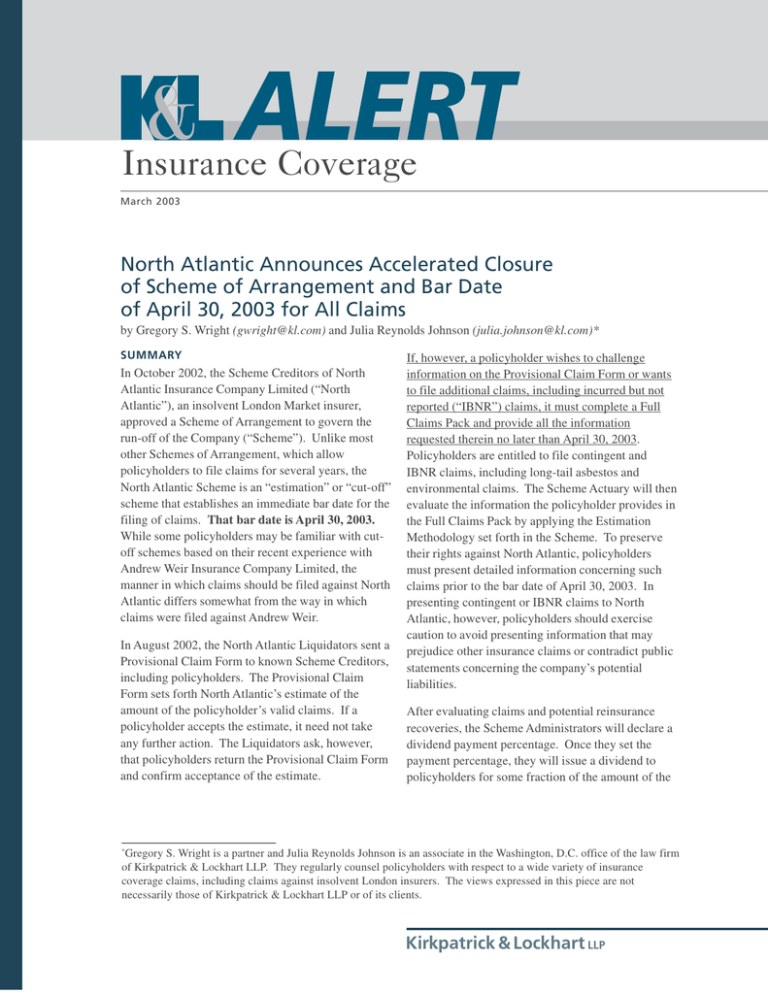
Insurance Coverage
March 2003
North Atlantic Announces Accelerated Closure
of Scheme of Arrangement and Bar Date
of April 30, 2003 for All Claims
by Gregory S. Wright (gwright@kl.com) and Julia Reynolds Johnson (julia.johnson@kl.com)*
SUMMARY
In October 2002, the Scheme Creditors of North
Atlantic Insurance Company Limited (“North
Atlantic”), an insolvent London Market insurer,
approved a Scheme of Arrangement to govern the
run-off of the Company (“Scheme”). Unlike most
other Schemes of Arrangement, which allow
policyholders to file claims for several years, the
North Atlantic Scheme is an “estimation” or “cut-off”
scheme that establishes an immediate bar date for the
filing of claims. That bar date is April 30, 2003.
While some policyholders may be familiar with cutoff schemes based on their recent experience with
Andrew Weir Insurance Company Limited, the
manner in which claims should be filed against North
Atlantic differs somewhat from the way in which
claims were filed against Andrew Weir.
In August 2002, the North Atlantic Liquidators sent a
Provisional Claim Form to known Scheme Creditors,
including policyholders. The Provisional Claim
Form sets forth North Atlantic’s estimate of the
amount of the policyholder’s valid claims. If a
policyholder accepts the estimate, it need not take
any further action. The Liquidators ask, however,
that policyholders return the Provisional Claim Form
and confirm acceptance of the estimate.
If, however, a policyholder wishes to challenge
information on the Provisional Claim Form or wants
to file additional claims, including incurred but not
reported (“IBNR”) claims, it must complete a Full
Claims Pack and provide all the information
requested therein no later than April 30, 2003.
Policyholders are entitled to file contingent and
IBNR claims, including long-tail asbestos and
environmental claims. The Scheme Actuary will then
evaluate the information the policyholder provides in
the Full Claims Pack by applying the Estimation
Methodology set forth in the Scheme. To preserve
their rights against North Atlantic, policyholders
must present detailed information concerning such
claims prior to the bar date of April 30, 2003. In
presenting contingent or IBNR claims to North
Atlantic, however, policyholders should exercise
caution to avoid presenting information that may
prejudice other insurance claims or contradict public
statements concerning the company’s potential
liabilities.
After evaluating claims and potential reinsurance
recoveries, the Scheme Administrators will declare a
dividend payment percentage. Once they set the
payment percentage, they will issue a dividend to
policyholders for some fraction of the amount of the
*
Gregory S. Wright is a partner and Julia Reynolds Johnson is an associate in the Washington, D.C. office of the law firm
of Kirkpatrick & Lockhart LLP. They regularly counsel policyholders with respect to a wide variety of insurance
coverage claims, including claims against insolvent London insurers. The views expressed in this piece are not
necessarily those of Kirkpatrick & Lockhart LLP or of its clients.
Kirkpatrick & Lockhart LLP
claim identified on the Provisional Claim Form or
the amount of the claim determined by the Scheme
Actuary. The Scheme Administrators anticipate that
a payment will be made in early 2004. They do not
yet know whether there will be sufficient funds to
make more than one payment.
BACKGROUND CONCERNING NORTH
ATLANTIC’S OPERATIONS
North Atlantic, formerly known as British National
Insurance Company Limited, underwrote policies
from approximately 1940 until 1984. In general,
North Atlantic would assume a share of London
Market policies along with other London-based
insurers.
In addition, North Atlantic retains some liability for
policies underwritten by the following other
companies: Bellefonte UK Branch (for policies
underwritten between 1972 and 1981); Parcels &
General (for certain policies underwritten between
the 1890s and 1984); and M. E. Rutty (for certain
policies underwritten between 1962 and 1974).
In 1984, North Atlantic ceased underwriting new
business. In 1997, it was placed into provisional
liquidation. In October 2002, the creditors of North
Atlantic approved a Scheme of Arrangement to
govern the run-off of the Company.
DECISION TO ADOPT AN ESTIMATION
SCHEME
A Scheme of Arrangement is essentially a contract
among the creditors of an insolvent insurer that
governs the distribution of the assets of the insolvent
insurer.1 North Atlantic’s Scheme, which is known
as an estimation or cut-off Scheme, differs in many
significant ways from the reserving schemes used by
other insolvent London insurers in the past decade.
For example, reserving schemes typically do not
impose a bar date on claims at the outset of the
scheme, and policyholders generally may file claims
at any point during the life of the scheme. Thus,
policyholders may wait to file long-tail or IBNR
claims until such claims mature throughout the
extended life of the scheme.2 In addition, reserving
schemes generally authorize the Scheme
Administrator to make periodic payments to
creditors for a fixed percentage of agreed claims.
This process allows policyholders with liquidated
claims to gain some recovery much earlier in the
liquidation process rather than waiting for one
payment after all claims have been resolved.3
In contrast, North Atlantic has adopted an estimation
or cut-off Scheme that requires policyholders to
submit all claims by a bar date of April 30, 2003.
Rather than waiting for IBNR or contingent claims to
mature, policyholders must present sufficient
evidence of the claims prior to the bar date to allow
the Scheme Administrators to estimate the value of
their claims. This process has obvious advantages
and disadvantages. On the one hand, there is a
greater potential that policyholders and the Scheme
Administrators will disagree on the value of
contingent or IBNR claims. On the other hand, this
process will allow policyholders to obtain at least
some recovery from North Atlantic within a year or
so, rather than waiting years for their long-tail or
IBNR claims to mature.
The Liquidators favored an estimation Scheme for a
number of reasons, including that North Atlantic
(1) has liabilities that are roughly five times greater
than its assets; (2) has been in run-off since 1984, so
many of the claims are mature; (3) has limited assets,
and an initial dividend percentage under a reserving
scheme would be quite low; and (4) has limited
investments from which it could derive income to
cover all the costs of a lengthy run-off. Moreover,
the Liquidators believe that the estimation Scheme
will allow them to make an early distribution to
Scheme Creditors and to conclude the run-off of
North Atlantic’s business relatively quickly. The
Liquidators also believe that the use of the
Estimation Methodology in the Full Claims Pack will
lead to a cost-effective and fair process for
estimating claims.
POLICYHOLDERS SHOULD EXERCISE CAUTION
Policyholders should consider various business
issues before pursuing IBNR claims against North
Atlantic. They should exercise caution in taking
positions that may maximize their recovery against
1
See Kalis, Reiter, and Segerdahl, The Policyholder’s Guide to the Law of Insurance Coverage, § 22.03.
Id.
3
Id.
2
Kirkpatrick & Lockhart LLP
2
North Atlantic, but negatively impact a potential
larger recovery against the solvent London Market or
other insurers. In addition, for various business
reasons or to avoid conflicts with reporting
requirements, policyholders may not want to estimate
future contingent liabilities or share internal
projections for such liabilities.
DETAILS REGARDING OPERATION OF THE
SCHEME AND CLAIMS
Policyholders may wish to consult the North Atlantic
Scheme, which is available at North Atlantic’s
website (www.northatlanticinsurance.co.uk), for
further explanation concerning how policyholders
should file claims and how the Scheme
Administrators will process the claims. We have
summarized below just a few of the topics addressed
therein.
Submission of Claims
Initially, policyholders should review the Provisional
Claim Forms that were distributed in August 2002. If
a policyholder of North Atlantic has not received a
Provisional Claim Form, it should immediately
request a copy from the Scheme Administrators. The
Provisional Claim Form should explain how North
Atlantic estimated any claims, including any discount
for the time value of money.
If a policyholder agrees with the information on the
Provisional Claim Form, it should simply confirm its
approval with the Scheme Administrators. If a
policyholder confirms its approval or fails to respond
by the April 30, 2003 bar date, then its claim will be
fixed at the amount (if any) shown on the Provisional
Claim Form.
If a policyholder believes that a simple and obvious
correction should be made to the form, it may ask the
Scheme Administrators to make the correction and to
issue a revised form. It is a matter for the Scheme
Administrators’ discretion whether they will respond
to any such request.
On the other hand, if a policyholder disputes the
information on the Provisional Claim Form or wishes
to file additional claims, it should complete a Full
Claims Pack. Policyholders are encouraged to
complete Full Claims Packs using North Atlantic’s
website (www.northatlanticinsurance.co.uk), but they
may submit the form via mail as well. The
Liquidators have encouraged all policyholders with
mature claims, claims exceeding North Atlantic
policy limits, or IBNR claims that are not large
enough to justify expending the amount of work
necessary to complete a Full Claims Pack, to accept
the estimate in the Provisional Claim Form.
Policyholders, however, must determine for
themselves the potential benefit of pursuing
additional claims or challenging the information in
the Provisional Claim Form.
Handling of Claims
The Scheme Administrators will then attempt to
validate information submitted by policyholders in
Full Claims Packs and may request additional
information if necessary. If the Scheme
Administrators have questions about the validity or
reasonableness of a claim or fail to reach an
agreement with the policyholder on the value of a
claim, the Scheme Administrators may refer the
claim to the Scheme Adjudicator. Scheme
Creditors, however, cannot initiate the Scheme
Adjudication process.
Under the Scheme, the Scheme Adjudicator is
charged with the responsibility of resolving disputes
that may arise between the Scheme Administrators
and policyholders. The Scheme Adjudicator may
request additional evidence from both parties. After
reviewing the claim, the Scheme Adjudicator will
determine what evidence to forward to the Scheme
Actuary. The first Scheme Adjudicator will be Keith
Garwood and a summary of his qualifications and
experience is set out in Appendix 12 to the Scheme.
Once sufficient claims information has been
accepted by the Scheme Administrators or
determined by the Scheme Adjudicator, it will be
passed to the Scheme Actuary to estimate the value
of claims using the Estimation Methodology set
forth in the Scheme. However, policyholders should
know that the estimates calculated by the Scheme
Actuary are not open to dispute or challenge.
The Liquidators expect that this process will take six
to nine months to complete.
Payments to Scheme Creditors
When the Scheme Administrators believe that
sufficient claims have been determined and that
there are sufficient funds available to make a
Kirkpatrick & Lockhart LLP
3
dividend payment worthwhile, they will calculate
the Available Distributable Amount. They will take
into account unascertained claims and future costs
and contingencies. The Scheme Administrators will
periodically review the dividend rate and, if
appropriate, may declare an increase and pay further
dividends. The Liquidators cannot estimate the
future dividends that will be paid to Scheme
Creditors because they do not, among other things,
know how much reinsurance will be collected.
CONCLUSION
In sum, policyholders should carefully review the
Provisional Claim Form provided by North Atlantic.
Policyholders should determine whether they will
accept North Atlantic’s estimate or whether they wish
to complete the Full Claims Pack and provide the
required information concerning additional claims,
including IBNR claims. In any event, policyholders
must submit claims before the April 30, 2003 bar
date.
The Insurance Coverage practice group at Kirkpatrick & Lockhart LLP is one of the nation’s largest
policyholder-oriented practices. Its attorneys have authored Policyholder’s Guide to the Law of
Insurance Coverage and edited the Journal of Insurance Coverage.
For additional information concerning this topic or Kirkpatrick & Lockhart LLP’s insurance coverage
practice, please consult the Kirkpatrick & Lockhart LLP office contacts listed below:
Boston
John M. Edwards
617.261.3123
jedwards@kl.com
Dallas
Robert Everett Wolin
214.939.4909
rwolin@kl.com
Harrisburg
Raymond P. Pepe
717.231.5988
rpepe@kl.com
Los Angeles
David P. Schack
310.552.5061
dschack@kl.com
Miami
Daniel A. Casey
305.539.3324
dcasey@kl.com
Newark
Anthony La Rocco
973.848.4014
alarocco@kl.com
NewYork
Peter J. Kalis
212.536.4828
pkalis@kl.com
Pittsburgh
Peter J. Kalis
412.355.6562
pkalis@kl.com
San Francisco
Edward Sangster
415.249.1028
esangster@kl.com
Washington
Matthew L. Jacobs
Gregory S. Wright
202.778.9393
202.778.9250
mjacobs@kl.com
gwright@kl.com
®
Kirkpatrick & Lockhart LLP
Challenge us.
®
www.kl.com
BOSTON
DALLAS
HARRISBURG
LOS ANGELES
MIAMI
NEWARK
NEW YORK
PITTSBURGH
SAN FRANCISCO
WASHINGTON
.........................................................................................................................................................
This publication/newsletter is for informational purposes and does not contain or convey legal advice. The information herein
should not be used or relied upon in regard to any particular facts or circumstances without first consulting a lawyer.
© 2003 KIRKPATRICK & LOCKHART LLP.
ALL RIGHTS RESERVED.

